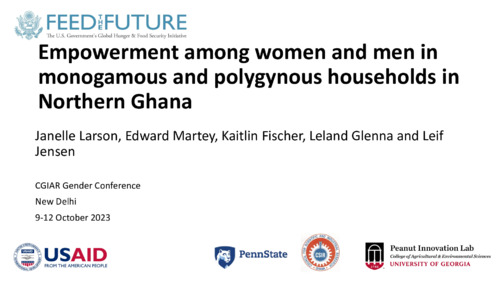Empowerment among women and men in monogamous and polygynous households in Northern Ghana
Abstract
A number of studies have linked women’s empowerment (often measured by a version of the Women’s Empowerment in Agriculture Index, WEAI) to various development outcomes, especially related to nutrition and well-being among children. However, there is less exploration of how empowerment various among wives in polygynous households. Furthermore, it is unknown how various domains of empowerment, as measured by the A-WEAI, differ among wives in such households. We surveyed household heads (husbands and all wives) in 68 households in two communities in Northern Ghana. Of these, 35 households were polygynous and 33 monogamous. Among the women in polygynous households, 35 were first wives, 34 were second wives (one was traveling) and four were third wives. Using the 5DE A-WEAI, we found that women are significantly less empowered than men in these communities across all domains other than group membership. A key driver of disempowerment among women was time poverty—nearly half of the women (47%) worked more than 10.5 hours per day, compared to 21% of the men. Interestingly, there was no significant difference in empowerment between wives in monogamous households and those in polygynous household, indicating that the larger culture (in these two communities) plays a more significant role than household structure in determining opportunities to women to have agency in their lives.

